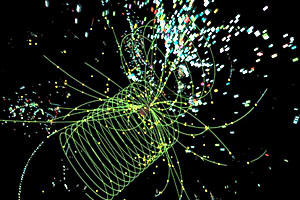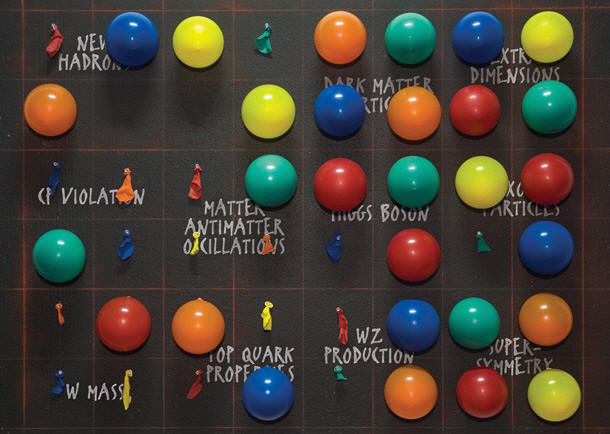 |
Introductory
Particle &
Nuclear
Physics
Physics
595
(substitutes
for 495)
Spring
2008
32354 (3)
|

|
|
A survey
from a historical
perspective. Emphasis on
the importance of
experiment to physics and
the use of symmetry
principles to understand
observations. Although
having studied scattering
theory, field theory, and
group theory would be
useful, no prior knowledge
of these subjects is
assumed. Undergraduates
welcome.
|
Text: Subatomic Physics, 3rd Ed, Henley &
Garcia, World Scientific, 2007
Homework Sets:
Late homework will not be
accepted, except for the following reasons: illness
and/or an emergency such as a death in your family.
If you want to turn your homework in late, then you
must contact the instructor before the it is due,
or as soon after it is due as possible. You must
get approval. Approval is not automatic.
Academic Integrity:
All students are
expected to uphold the highest standards of honesty
and integrity in their academic work. All graded
work, including homework problems, is to be done on
an individual basis. Any incidence of academic
dishonesty will be dealt with in accordance with
OSU policies.
Students with Disabilities:
Students with
documented disabilities who need special
accommodations should make an appointment with the
instructors as soon as possible to discuss the
accommodations. You are encouraged to discuss
assignments with the instructors and other
students. However, even if you work in a group, you
need to understand all work that you hand in. When
you place your name on an assignment, we view it as
a signed statement that it is your work and that if
asked to, you can explain it. Handing in another
student's assignment without acknowledgement is
academic dishonesty and will result in an F grade
for the entire course.
Final Project
Students are required to
write and present a report on recent journal
articles in the field of subatomic physics as their
final assignment. The report must be 3 to 5 pages
in length, typed, double-spaced and include
references or footnotes pointing back to the
articles that were read. The report is due ?? June.
Final Grades:
Attendance &
Participation 5%, Midterms 40%, Final Project 5%,
Homework 50%.
Links:
Particle Data Group (tables and more):
http://pdg.lbl.gov/
Cornell e-print archive:
http://arxiv.org/
High Energy Physics Literature Database:
http://www.slac.stanford.edu/spires/
NASA Astrophysics Data System:
http://adswww.harvard.edu/
Books on Reserve:
Nuclear and particle
physics, Â Frauenfelder, Hans, Henley,
Ernest M. , QC793.2 .F68, W.A. Benjamin,
Invariance principles and elementary particles,
Sakurai, Jun John, Princeton University Press,
1964, QC793.3.S9 S3
Concepts of particle physics, Gottfried, Kurt,
Weisskopf, Victor Frederick; Clarendon Press;
Oxford Uni, QC793.2 .G68 1984
Introduction to elementary particles, Griffiths,
David J. Harper & Row, c1987, Q2522 H34
1984
Quarks and leptons : an introductory course in
modern particle, Halzen, Francis, Martin, Alan D.,
Wiley, c1984,
Quantum mechanics II : a second course in quantum
theory, Landau, Rubin H., J. Wiley, 1990, QC174.12
.R356 1990
Particles & Nuclei, Povh,B, Springer, 2006,
QC776 .T4513 1999
